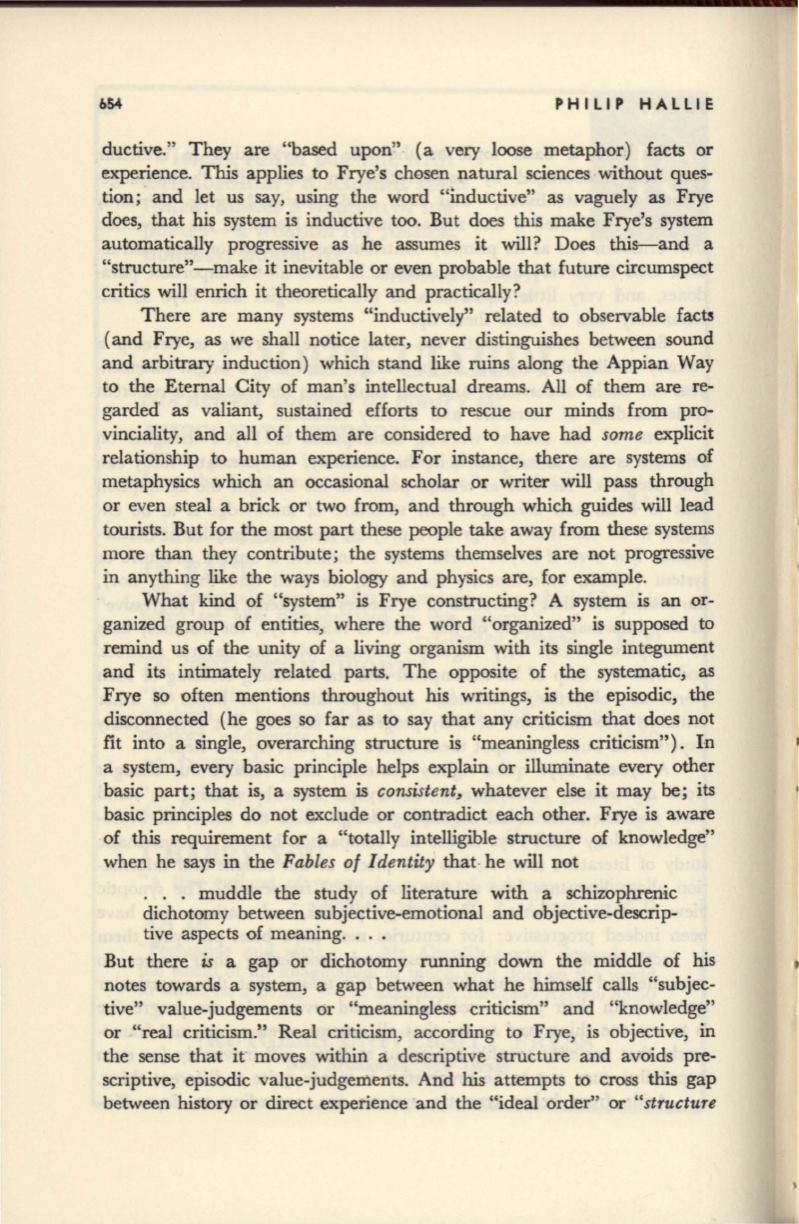

PHILIP HAlliE
ductive." They are "based
upon~'
(a very loose metaphor) facts or
experience. This applies to Frye's ch0sen natural sciences without ques–
tion; and let us say, using the word "inductive" as vaguely as Frye
does, that his system is inductive too. But does this make Frye's system
automatically progressive as he assumes it will? Does this-and a
"structure"-make it inevitable or even probable that future circumspect
critics will enrich it theoretically and practically?
There are many systems "inductively" related
to
observable facts
(and Frye, as we shall notice later, never distinguishes between sound
and arbitrary induction) which stand like ruins along the Appian Way
to the Eternal City of man's intellectual dreams. All of them are re–
garded as valiant, sustained efforts to rescue our minds from pro–
vinciality, and all of them are considered to have had
some
explicit
relationship to human experience. For instance, there are systems of
metaphysics which an occasional scholar ,or writer will pass through
or even steal a brick or two from, and through which guides will lead
tourists. But for the most part these people take away from these systems
more than they contribute; the systems themselves are not progressive
in anything like the ways biology and physics are, for example.
What kind of "system" is Frye constructing? A system is an or–
ganized group of entities, where the word "organized" is supposed to
remind us of the unity of a living organism with its single integument
and its intimately related parts. The opposite of the systematic, as
Frye so often mentions throughout his writings, is the episodic, the
disconnected (he goes so far as to say that any criticism that does not
fit into a single, overarching structure is "meaningless criticism"). In
a system, every basic principle helps explain or illuminate every other
basic part; that is, a system is
consistent,
whatever else it may be; its
basic principles do not exclude or contradict each other. Frye is aware
of this requirement for a "totally intelligible structure of knowledge"
when he says in the
Fables of Identity
that, he will not
. . . muddle the study of literature with a schizophrenic
dichotomy between subjective-emotional and objective-descrip–
tive aspects of meaning. . . .
But there
is
a gap or dichotomy running down the middle of his
notes towards a system, a gap between what he himself calls "subjec–
tive" value-judgements or "meaningless criticism" and "knowledge"
or "real criticism." Real criticism, according to Frye, is objective, in
the sense that it moves within a descriptive structure and avoids pre–
scriptive, episodic value-judgements. And his attempts to cross this gap
between history or direct experience and the "ideal order" or
"structure









